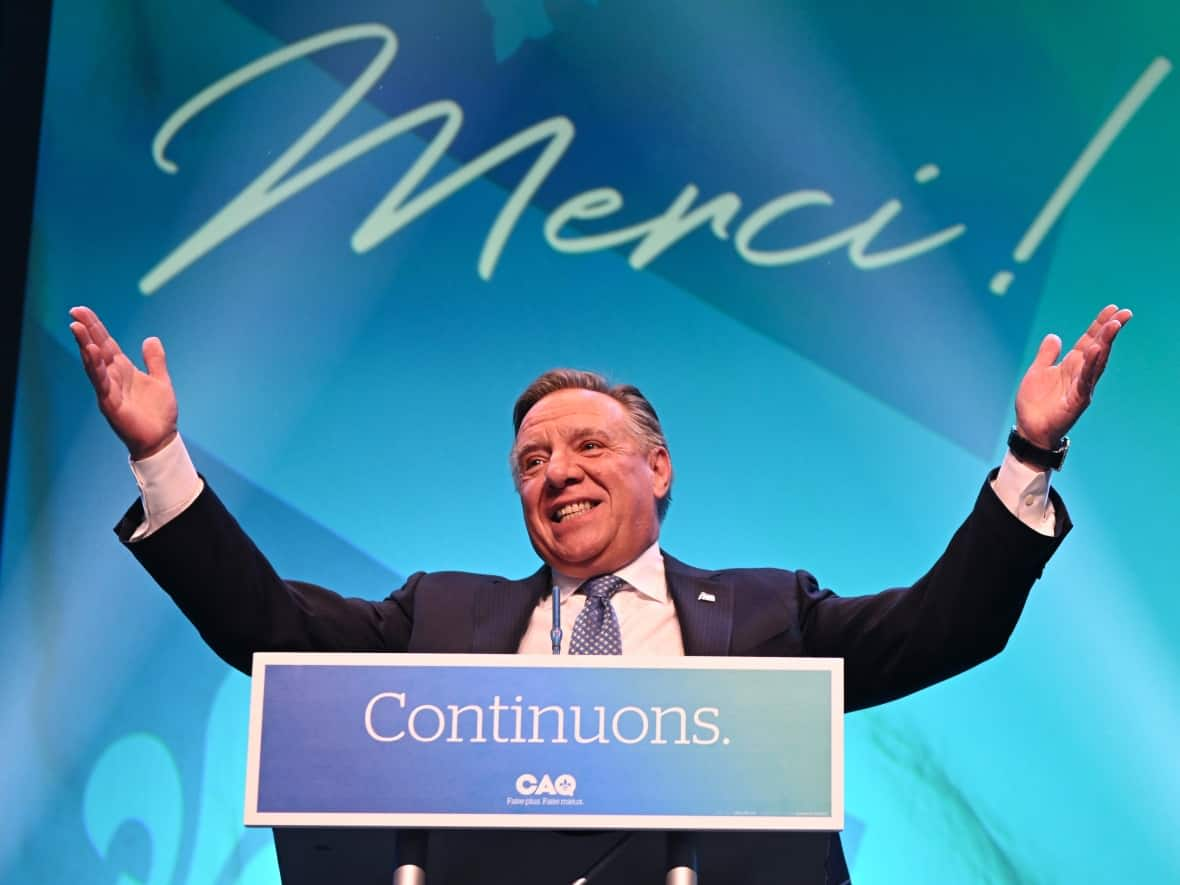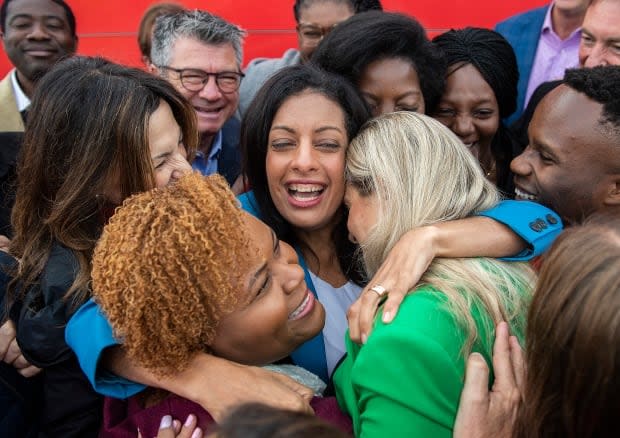CAQ sails to victory in Quebec with largest majority in decades

François Legault's Coalition Avenir Québec has won back-to-back provincial elections, securing a landslide victory on Monday and, with even larger majority, cementing itself as a political powerhouse.
The CAQ was elected in 90 ridings, making it the highest number of seats won by a party in a Quebec election since 1989, when Robert Bourassa's Liberals won 92 seats.
The CAQ entered the election campaign with 76 seats — 63 are needed for a majority in the National Assembly.
Late Monday, Legault addressed his supporters at his party's election night headquarters in Quebec City to celebrate his victory.
"We got a clear message [tonight]. Quebecers sent a strong message, Quebecers told us 'Let's continue!'" Legault said in reference to his party's campaign slogan.
The CAQ is the first party other than the Quebec Liberals or the Parti Québécois to win back-to-back majorities since 1956.
WATCH | Legault's victory speech:
The party managed to grow its majority without increasing its footprint in Montreal. The CAQ won only two seats on the island, the same as in 2018, though it did manage to win at least four of six seats in Laval.
Provincewide, a large CAQ majority always seemed the most likely outcome even with Legault and his party making headlines during the campaign with controversial statements on immigration. The premier apologized for a statement that linked immigrants to extremism and violence.
"An election divides," Legault said. "Quebecers make up a great people and when I say Quebecers make up a great people I'm talking about all Quebecers from all regions, from all ages, from all origins. I will be the premier for all Quebecers."
With Liberal candidates being elected in 21 ridings the party once again finished in second place and will form the Official Opposition, four years after its crushing defeat in 2018. Québec Solidaire has been elected in 11 seats.
Led by co-spokesperson Gabriel Nadeau-Dubois, the party increased its seat total at the National Assembly for the fifth consecutive general election.
"What are we going to do at the National Assembly starting in a few weeks? Well, we will fight for what really matters," Nadeau-Dubois told supporters during his speech Monday night. "We will fight for people's health, for the health of the environment. We will fight to fix the housing crisis."
The PQ's seat count dropped and the party is left with only three ridings. The Quebec Conservatives failed to win a single seat, although they dramatically improved their share of the popular vote.
The seat totals for both the PQ and the Liberals are the lowest in the history of their parties.

Legault's party entered this campaign with a commanding lead in polls, leaving his main opponents essentially battling for second place.
Inflation, health care and immigration were among the issues that dominated the five-week campaign. For 36 days, the CAQ campaigned under the slogan "Continuons," French for "Let's Continue."
The right-of-centre party — co-founded by Legault in 2011 — touted itself as the experienced choice to continue building the province's economy, fix its reeling health-care system and guard against the decline of the French language.
A second straight majority for Legault's party means the province is even further removed from the traditional debate about federalism and sovereignty with the Liberals and the PQ as the two main parties.
For years, the CAQ has managed to appeal to a large number of Quebecers across the political spectrum, according to Lisa Birch, an associate professor with Université Laval in Quebec City.
"The CAQ has been very successful in targeting the sort of median voter who's centre-right on economic policy and public finance but still leans a little to the left in terms of ensuring that we have investments in education and health care," Birch told CBC News.

Pandemic spotlight
The party's first term was largely defined by its management of the COVID-19 pandemic. More than 16,700 Quebecers have died from the disease.
Although the government was scrutinized for its pandemic policies, which included vaccination passports, business and school closures and overnight curfews, the public health emergency also put a bigger spotlight on Legault and the CAQ.
The premier's daily briefings to the media and the public left little room for the opposition parties to participate in discourse on public-health measures. And Legault's long-term use of emergency measure powers ensured there was little scrutiny or debate at the National Assembly.
The Quebec Liberals' Dominique Anglade and the Parti Québécois's Paul St-Pierre Plamondon — who both ran in the Montreal area — became the leaders of their parties during the first year of the pandemic.

During the Legault government's first term, it adopted the controversial religious symbols law, known as Bill 21, and the reform of the Charter of the French Language, known as Bill 96. The CAQ government used the notwithstanding clause to protect both laws from Charter challenges, but they are both being debated in the courts.
At dissolution, the Liberals formed the Official Opposition with 27 seats. Québec Solidaire and the Parti Québécois had 10 and seven seats, respectively. The Conservative Party of Quebec (PCQ) had one, after a CAQ MNA crossed the floor. There are 125 seats in Quebec's National Assembly.
Prime Minister Justin Trudeau congratulated Legault for his victory.
All leaders win seats, except Duhaime
The premier also won his seat in L'Assomption.
Nadeau-Dubois, the co-spokesperson for Québec Solidaire secured his seat in the Montreal riding of Gouin. Anglade will continue to be the MNA in the city's Saint-Henri–Saint-Anne riding. Paul St-Pierre Plamondon, the leader of the Parti Québécois, defeated CAQ incumbent Richard Campeau to win in Camille-Laurin, located in Montreal's east end.
PCQ Leader Éric Duhaime failed to win the Chauveau riding, located in the Quebec City region.
Élections Québec says voter turnout was 66.06 per cent, slightly lower than in 2018, when 66.45 per cent of eligible Quebec voters cast a ballot.


